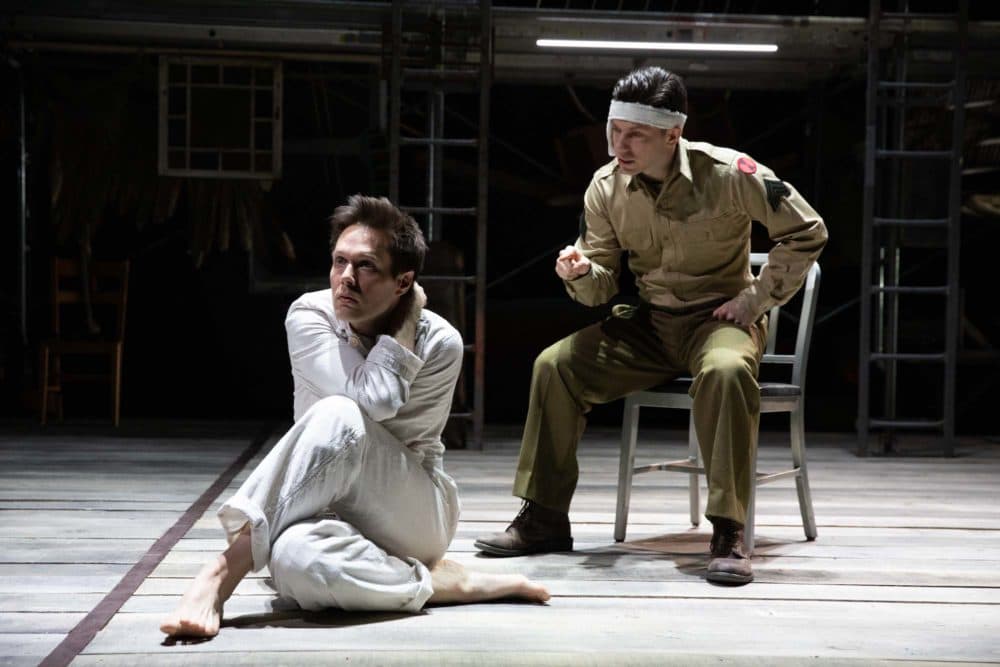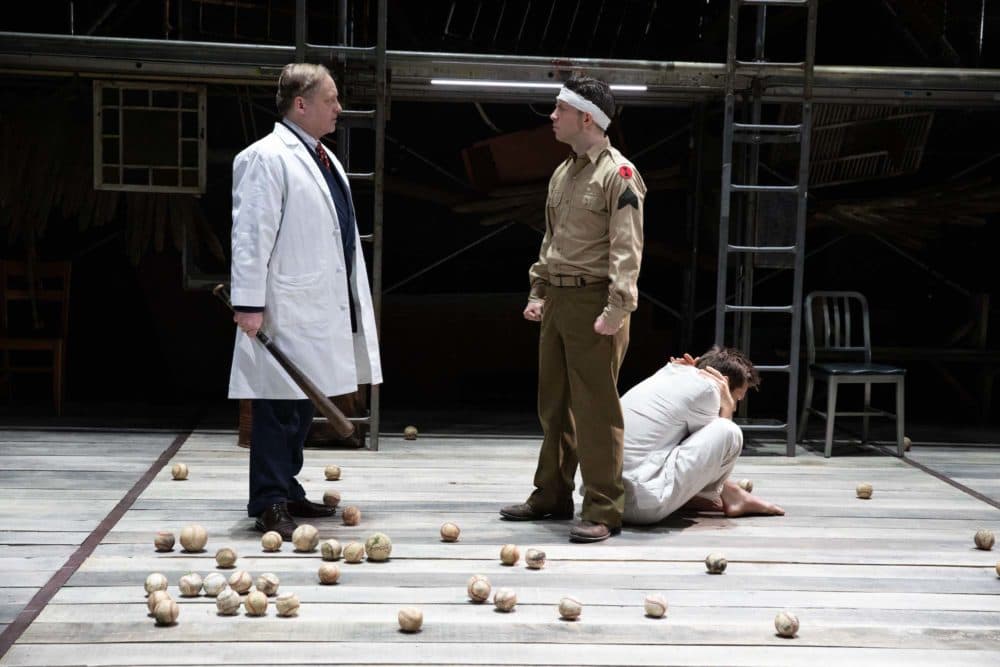Advertisement
Review
Naomi Wallace's Adaptation Of 'Birdy' Takes Graceful Flight At Babson College

Most Bostonians know Commonwealth Shakespeare Company from the highly-attended Shakespeare productions on Boston Common. For the past few years, though, I've been much more interested in the productions that CSC mounts at its base at Babson College, the latest of which is a fine production of "Birdy," adapted by Naomi Wallace from William Wharton's novel.
It's the 1984 movie that brought "Birdy" into the mainstream. Featuring Matthew Modine and Nicolas Cage, back when Cage made good movies instead of assaultive video games, the story of the unusual friendship of two young men, one a high-school jock and the other an eccentric bird lover, was an outright charmer. It also became the theatrical obsession of Spring Sirkin, a Tony-winning producer who runs Chamber Theatre Productions in Boston, and who sought Wallace out to write the script. (Disclosure: Sirkin is also a supporter of the Elliot Norton Awards, administered by the Boston Theater Critics Association, of which I'm a member.)
Sirkin found the right soulmate in Steven Maler, head of the CSC, who also directed "Birdy." Maler was at the American Repertory Theater when it produced Wallace's earlier "Slaughter City," in the '90s. Wallace, who's found more success in England than here, is also a poet and her ability to infuse politically-weighted subject matter with soulful language and a somewhat abstract means of story development, make "Birdy" (through March 17) such a strong fellow traveler with Samuel Beckett and Caryl Churchill, among others, at Babson.
The success of the play and the production rests largely in Wallace and Maler's ability to artfully suggest the issues of the play. The audience has to accept the unlikely duo bonding in the first place. Jocks generally put as much distance as they can between themselves and boys who are more interested in birds than beer in high school. So why is Al, with testosterone on parade, so drawn to Birdy, who would rather find a way of mating with a bird or flying through the air than finding a date to the prom?
Therein lies the mystery of the book, the movie and the play, which time travels between their high school days in Philadelphia and their wounded-veteran status at a facility in post-World War II Kentucky. Al, a sergeant who's lost part of his face, is there to try to bring Birdy out of his acute PTSD — he prowls his room as if he's a bird, huddled in on himself, refusing to speak and only barely accepting food from an attendant, who's a conscientious objector.

Two sets of actors play the two characters — Spencer Hamp as young Birdy and Maxim Chumov as young Al; Will Taylor and Keith White are the wounded vets. If older Al can't get him out of his avian state, Birdy will be shipped off to a less tolerant facility.
Hamp and Chumov are particularly effective at forming that mysterious bond. They make you readily accept that these guys are not mismatched; they simply complete each other — Al the jock even more so than Birdy. Al is beaten at home and he's more a prisoner of a macho culture that gets him to think that he's the second coming of John Wayne mixed with the sexual magnetism of Frank Sinatra.
And to an extent he is. The scene in which Chumov is trying to teach Hamp how to round the bases with his prom date is hilarious and, given Wallace's feminism, inoffensive even under today's #MeToo spotlight. Hamp's ability to render Birdy's passion endearing is particularly praiseworthy.
Advertisement
Taylor as the older Birdy is also terrific in a nonspeaking part. What is going through his head? The horrors of war? His complete alienation from the human species? Being placed in a cage like his bird buddies? Again, the power of his situation stems from Wharton, film director Alan Parker and Wallace never spelling it out. Yet his silence speaks volumes about the scars of war, much more than anything the other characters — the psychiatrist, the CO attendant, older Al — have to say.

White, as older Al, could use more help. Why, for example, is he saddled with a much stronger accent — more geographical than ethnic — than younger Al? It's understandable that he's more closed down and less naive, but there's little left of younger Al in his performance. The two younger actors often look on from above, on one of the three tiers above the stage. Often in theater and film it's the older incarnation looking in on the younger, but Wallace nicely flips it here, as if to say that the older characters are trying to connect with their younger, freer selves.
The industrial staging suggests moments from their past, but generally serves to keep the high schoolers on a perch far from the human rat race of wars and everyday concerns.
There's a strong anti-war undercurrent to the play, and it's brave to set it during "the good war." But there's no getting away from the horror of war no matter how just or necessary the cause is.
In the end, though, the play is about transcendence and the forces that keep us earth-bound. The playwright and the production provide the transcendence for the audience even if it's questionable whether the characters will ever be allowed to provide it for themselves.
"Birdy" continues through March 17 at Babson College's Carling-Sorenson Theater.
